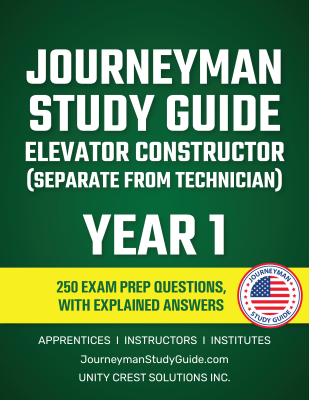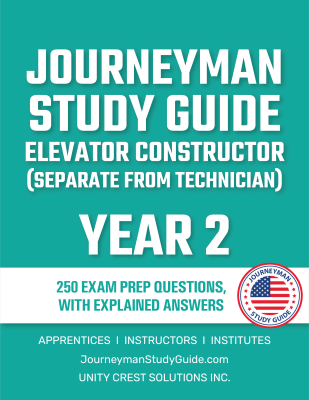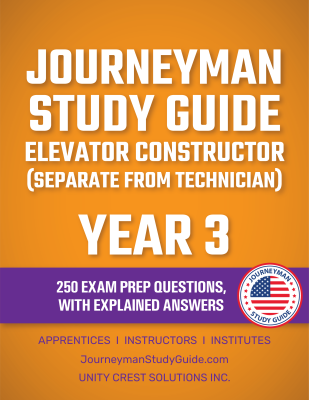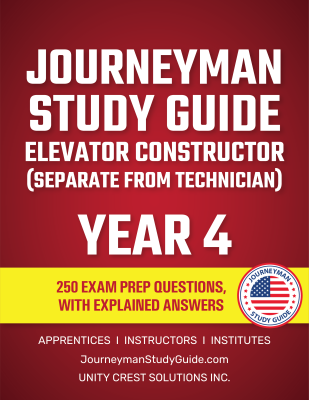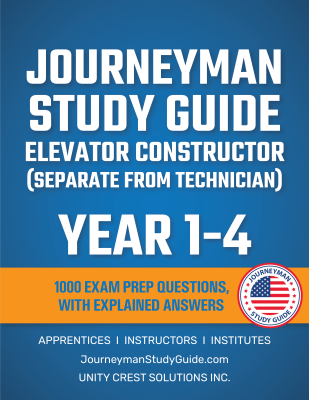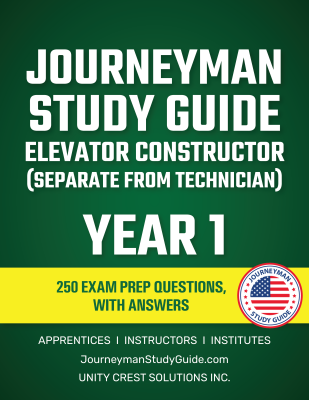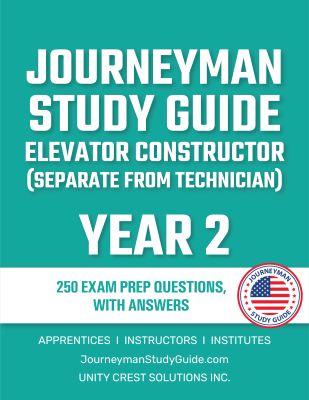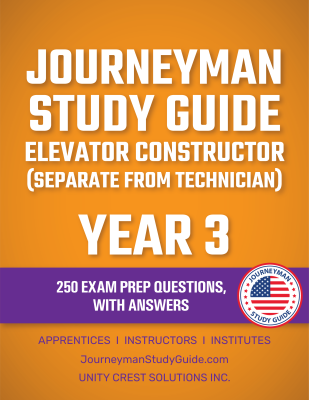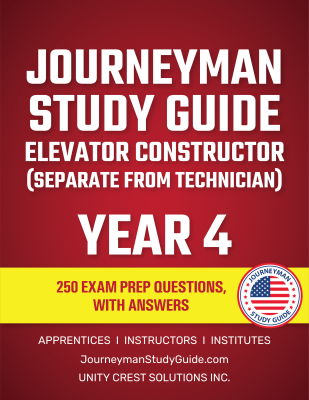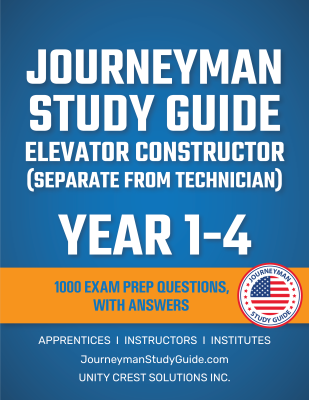Questions, Answers, & Explanations
Get clear explanations behind every answer, perfect for deeper learning and more thorough exam preparation.
Site Updates in Progress: Things might look different as we work on enhancing your experience.
What is an Elevator Constructor?
An Elevator Constructor, also known as an Elevator Mechanic, specializes in the installation, maintenance, and repair of elevators, escalators, and other lifts. These professionals are skilled in ensuring that vertical transportation systems in residential, commercial, and industrial buildings operate safely and efficiently. Unlike other construction professionals, elevator constructors work with complex electrical and mechanical systems that require specialized knowledge and training.
Key Responsibilities
As an Elevator Constructor, your responsibilities will vary depending on the specific project but will generally include the following tasks:
Skills and Traits for Success
To excel as an Elevator Constructor, it’s important to have the following skills:
Industries Where Elevator Constructors Thrive
Elevator constructors can find employment across various industries, including:
Why Choose This Career?
The elevator constructor profession offers a rewarding career for those interested in a hands-on, technically challenging field. Here are some reasons why this career is worth pursuing:
Get Ready for Your Career in Elevator Construction!
Prepare for your career as an Elevator Constructor with our expert-designed Q&A guides, Q/A Explanations, and online tests. These resources are tailored to help you succeed in the Elevator Constructor certification exam and advance your career in this growing field.
What to Expect on the Certification Exam
The Elevator Constructor certification exam assesses an individual's knowledge of the installation, maintenance, and repair of elevators, escalators, and other vertical transportation systems. This exam evaluates technical skills, safety protocols, mechanical systems knowledge, and understanding of the National Electrical Code (NEC) as it pertains to elevators.
Exam Format
The Elevator Constructor certification exam typically consists of the following:
Key Topics Covered
Passing Requirements
Most certification exams for Elevator Constructors require a minimum passing score of 70% to demonstrate competency. Each certifying body may have specific passing thresholds, but this range is typical. Ensuring a deep understanding of elevator technology, codes, and safety regulations is key to successfully passing the exam.
Tips for Preparing Effectively
1. Study with Structured Materials
To prepare effectively, use structured study guides like our Q&A and Q/A Explanation resources. These guides cover key topics in depth and help reinforce critical concepts needed for the exam.
2. Practice with Online Tests
Our online practice tests are an excellent way to simulate the exam experience. They provide real-time scoring and offer insights into areas that may need further review. These interactive tests allow you to familiarize yourself with the types of questions that will appear on the actual certification exam.
3. Hands-On Experience
While theoretical knowledge is important, hands-on experience is crucial. Work with elevator systems and perform routine maintenance or troubleshooting tasks during your apprenticeship or training program. Gaining real-world experience with different types of elevators will significantly enhance your preparedness.
4. Join Apprenticeship Programs
IUEC’s apprenticeship program is one of the most respected in the industry. Completing this program will provide practical, in-depth knowledge of elevator systems and their operation. The hands-on training you receive will be invaluable when taking the certification exam.
5. Seek Mentorship
Connecting with a mentor who is already a certified Elevator Constructor can provide valuable insights. A mentor can help you navigate complex concepts and share tips on preparing for the exam. Many unions like IUEC offer mentorship programs to apprentices and new entrants into the field.
Certification Body Recommendations
Several recognized organizations certify Elevator Constructors in the U.S. These certifications are highly regarded in the industry and are essential for career advancement:
Prepare for Your Certification Today!
Equip yourself with the knowledge and skills needed to succeed as an Elevator Constructor. Use our expert-designed Q&A guides, Q/A Explanations, and online tests to ensure you pass your certification exam and excel in your career.
What Types of Questions Are on the Certification Exam?
The Elevator Constructor certification exam tests both theoretical knowledge and practical skills related to the installation, maintenance, and repair of elevators, escalators, and other vertical transportation systems. The exam includes a mix of multiple-choice questions, scenario-based questions, and other formats designed to assess a wide range of technical skills.
Common Question Formats
1. Multiple-Choice Questions
These questions assess your understanding of various topics, including electrical systems, mechanical systems, and safety protocols. They test your knowledge of industry best practices and technical details related to elevator systems.
2. Scenario-Based Questions
These questions present a situation that you may encounter on the job, requiring you to select the best course of action based on your knowledge of elevator systems and safety practices. For example, you may be asked how to troubleshoot a malfunctioning elevator or resolve an issue with a broken component.
3. Safety Protocol Questions
These questions assess your understanding of workplace safety and proper handling of elevator systems. The exam may include questions on lockout/tagout procedures or safe lifting techniques, ensuring compliance with OSHA regulations.
4. Tool and Equipment Identification
You may be asked to identify various tools, components, or systems involved in elevator installation and maintenance. Knowledge of key equipment like hydraulic pumps, control panels, and cable systems is vital for this section.
Sample Questions
1. Mechanical System: Elevator Operation
What is the primary function of the counterweight in a traction elevator system?
Answer: B) To balance the load and make the elevator more efficient
2. Electrical System: Troubleshooting
An elevator fails to respond to the call button. What is the first step in troubleshooting the issue?
Answer: A) Check the fuse or circuit breaker to see if power is being supplied
3. Safety Protocol: Handling Malfunctions
If an elevator’s emergency brake is activated, what should be your first action?
Answer: B) Contact the supervisor and inform them of the malfunction
4. Code Compliance: NEC Standards
According to the National Electrical Code (NEC), what is the minimum distance an elevator control panel should be mounted from a floor?
Answer: C) 48 inches
Tips for Answering Exam Questions
1. Read Carefully
It’s essential to read each question carefully. Pay close attention to key terms such as "first step," "most efficient," or "best practice," as they will guide you toward the correct answer.
2. Use the Process of Elimination
When faced with multiple-choice questions, eliminate obviously incorrect answers to increase your chances of selecting the right one. Focus on eliminating answers that are out of context or don't align with industry best practices.
3. Practice Under Timed Conditions
Simulating real exam conditions is a great way to prepare for the test. Set a timer and take practice tests to improve your time management skills. This will help you become more comfortable with the pressure of the actual exam.
4. Study with Structured Materials
Using Q&A guides and Q/A explanations will help reinforce your understanding of key concepts. These materials are specifically designed to cover the critical areas tested in the certification exam. Take advantage of our online tests to gauge your readiness and pinpoint areas for improvement.
5. Hands-On Experience
Hands-on experience is invaluable for understanding the practical application of elevator installation, maintenance, and troubleshooting. If you are currently in an apprenticeship program or have access to an elevator system, take the opportunity to work with the equipment and practice identifying and resolving issues in real-time.
Practice Questions for Better Preparation
Our Q&A with Explanation guide provides a structured way to review material. This resource includes detailed explanations for each answer, helping you understand why a particular answer is correct. Additionally, our online tests simulate real-world scenarios, giving you the confidence to tackle the exam effectively.
Prepare for Your Certification Today!
Ensure success in your Elevator Constructor certification exam with our expertly designed Q&A guides, Q/A Explanations, and interactive online tests. These study materials are specifically tailored to help you gain the technical knowledge and practical skills needed to excel.
Morning: Preparing for the Day
The day for an Elevator Constructor begins with reviewing job assignments and preparing for the work ahead. Here’s what an elevator constructor might do in the morning:
Midday: Installation and Troubleshooting
After preparing for the day’s work, elevator constructors dive into the main tasks of elevator installation and troubleshooting:
Afternoon: Testing, Inspection, and Quality Control
After a busy morning and afternoon of installation, the final tasks of the day involve testing, inspection, and quality control:
Typical Work Environments
Elevator constructors work in a variety of environments, each with its own set of challenges and rewards:
Challenges and Rewards
Challenges:
Rewards:
Get Ready for Your Career in Elevator Construction!
Advance your skills and gain the necessary knowledge to become a certified Elevator Constructor. Our Q&A guides, Q/A Explanations, and interactive online tests will help you prepare for your certification exam and enhance your career prospects in the elevator construction field.
Earning Potential
Salaries for Elevator Constructors can vary based on factors such as experience, specialization, and geographic location. Here’s an overview of what you can expect in terms of earnings:
Regional Salary Differences
Salary ranges can also vary depending on the region:
Career Growth Opportunities
The Elevator Constructor field offers significant career advancement opportunities. A technician can move up through various stages of their career by gaining more experience, certifications, and specializations:
The Benefits of Certification
Elevator constructors who hold certifications from recognized organizations such as NICET (National Institute for Certification in Engineering Technologies), IUEC (International Union of Elevator Constructors), and NEII (National Elevator Industry, Inc.) can expect:
Success Stories
Get Ready to Advance Your Career in Elevator Construction!
Take the next step in your career as an Elevator Constructor by preparing for your certification with our expert-designed Q&A guides, Q/A Explanations, and interactive online tests. These resources are tailored to help you pass your certification exam and advance in this growing field.
General Wage Ranges
Salaries for Elevator Constructors depend on experience, location, and specialization within the field. The trade offers competitive pay, and opportunities for wage growth increase as you gain experience and certifications. Below is a general salary breakdown:
Regional Salary Differences
Salaries can vary significantly across the United States depending on the region, demand, and cost of living:
Factors That Impact Wages
Several factors contribute to the wage range for Elevator Constructors:
1. Certifications & Education
Elevator constructors with specialized certifications from reputable organizations like NICET (National Institute for Certification in Engineering Technologies), IUEC (International Union of Elevator Constructors), and NEII (National Elevator Industry, Inc.) often command higher wages. Certifications in high-rise elevator systems, hydraulic lifts, and smart elevator technologies can also boost earning potential.
2. Industry Specialization
Elevator constructors who specialize in areas like high-tech elevator systems, sustainable elevator designs, and smart buildings typically earn more than those working in traditional installations. The demand for green building technologies and smart home systems is increasing, and electricians who are well-versed in these technologies can increase their earnings.
3. Union Membership
Joining a union like the IUEC can significantly impact wage potential. Union members enjoy benefits like higher pay, health insurance, retirement plans, and job security. The IUEC represents elevator constructors across the U.S., and membership can lead to higher-paying jobs and protection against economic fluctuations. Union electricians typically earn 20% more than non-union workers in similar roles.
4. Experience & Expertise
Experience plays a vital role in determining salary. Elevator constructors who specialize in the installation and maintenance of complex elevator systems for skyscrapers, commercial complexes, and multi-family housing projects can earn significantly more. The more expertise you have in troubleshooting advanced elevator systems, the higher the salary you can command.
Earnings by Industry
Aerospace & Defense
Commercial & Residential Construction
Medical & Healthcare Facilities
Manufacturing & Industry
Opportunities for Wage Growth
Elevator constructors who seek continuous improvement and expand their skill set can access a wide range of opportunities for wage growth:
1. Advanced Certifications
Earning advanced certifications, such as NICET Level 3 or specialized training in green building technology and smart elevators, will make you more competitive in the field and increase earning potential.
2. Specialized Skills
Learning advanced technologies such as machine room-less elevators or solar-powered elevator systems will help you command higher wages.
3. Union & Employer Partnerships
Union membership with organizations like IUEC ensures fair wages, better working conditions, and job security.
4. Independent Contractor or Consulting
Experienced elevator constructors often branch out into self-employment, starting their own service businesses or offering consulting services. These paths offer substantial earning potential, especially in specialized elevator installation and repair sectors.
Boost Your Earning Potential in Elevator Construction!
Prepare for your career in Elevator Construction with our expert-designed Q&A guides, Q/A Explanations, and interactive online tests. These resources will help you achieve success in your certification exam and maximize your career earnings in this rewarding and high-demand field.
Essential Tools for Elevator Constructors
To succeed in the Elevator Constructor trade, you will need a variety of specialized tools and equipment. These tools are essential for ensuring the proper installation, maintenance, and repair of elevators, escalators, and lifts. Below are some of the key tools and equipment commonly used by professionals in the field:
1. Hydraulic and Mechanical Tools
2. Electrical Testing Instruments
3. Mechanic Tools and Equipment
4. Safety Gear
Recommended Learning Resources
Elevator constructors need to be well-versed in both technical skills and safety practices. Here are some essential educational and training resources for those pursuing a career in this field:
1. Apprenticeship Programs
2. Certifications and Technical Training
3. Manufacturer Training and Workshops
4. Online Resources and Forums
Suppliers and Material Resources
Elevator constructors rely on trusted suppliers like Grainger for tools and components, MatterHackers for industrial 3D printing materials, and 3D Systems for prototyping parts. To build a cost-effective toolkit, they can invest in versatile tools like drills and wrenches, buy refurbished equipment from suppliers such as Grainger or Toolbarn, and use open-source design software like FreeCAD or Blender to reduce expenses.
Why the Right Tools Matter
Using the right tools and equipment is essential for efficiency, accuracy, and safety in elevator construction. Investing in high-quality tools enhances the precision of installations and repairs, which directly impacts job performance and career growth.
Ready to Advance Your Skills in Elevator Construction?
Get started on your path to becoming a certified Elevator Constructor with our expert-designed Q&A guides, Q/A Explanations, and interactive online tests. These resources are tailored to help you prepare for your certification exam and succeed in the industry.
Where to Learn Elevator Construction
The Elevator Constructor trade offers specialized training programs across the U.S. These programs equip you with the skills needed to install, maintain, and repair elevators and escalators. Below are some of the top institutions and programs offering this valuable education:
Types of Education Programs
Educational paths for elevator constructors vary, depending on your goals and the depth of your expertise. Here are the types of programs available:
What to Expect in a Training Program
Training to become an elevator constructor combines classroom education with real-world experience. Here’s what students can expect during their training:
How to Choose the Right Program
When selecting an educational program, it’s important to consider the following factors to ensure it aligns with your career goals:
Featured Institutions
Ready to Advance Your Skills?
Prepare for your career as an Elevator Constructor with our expert-designed Q&A guides, Q/A Explanations, and interactive online tests. These resources are tailored to help you succeed in certification exams and further your career in the elevator construction industry.
Why Join a Union or Connect with Employers?
Unions and reputable employers provide critical job security, competitive wages, and numerous career growth opportunities for Elevator Constructors. As the demand for skilled professionals in the elevator and escalator industry continues to grow, unions and strong employers offer crucial resources for both career development and job security.
Benefits of Joining a Union
Union membership offers many advantages for Elevator Constructors, especially those working in the installation and maintenance of elevators across the U.S. Below are some of the key benefits:
Top Unions for Elevator Constructors
Joining a union can make a significant difference in an elevator constructor’s career. Here are some of the key unions in the elevator industry:
Connecting with Employers
Finding the right employer is essential for career growth. Many top employers in the elevator construction and maintenance industry are actively seeking skilled professionals. Some of the leaders in the field include:
Tips for Finding Work
To maximize your chances of securing a job as an elevator constructor, consider the following tips:
1. Network Through Industry Events
Attending industry events such as the Elevator Escalator Conference & Expo or The National Association of Elevator Contractors (NAEC) conventions provides an opportunity to network with potential employers. These events showcase the latest industry trends and technologies while offering networking opportunities with companies like Otis, KONE, and Schindler.
2. Earn Recognized Certifications
Employers in the elevator industry often prioritize applicants who have earned certifications from respected organizations such as NICET (National Institute for Certification in Engineering Technologies). Programs offered by the IUEC or NEII (National Elevator Industry, Inc.) are widely respected and can significantly enhance job prospects.
3. Leverage Union Membership
Union membership with IUEC can provide access to numerous benefits, including job placement assistance, apprenticeships, and apprenticeship programs, all of which can help secure high-paying jobs in the elevator industry.
Conclusion: Career Growth in Elevator Construction
As the demand for high-rise buildings and modernized elevator systems continues to grow, the elevator construction field offers significant opportunities for career advancement and job security. Joining a union like IUEC or working for top employers like Otis or KONE provides both financial and professional rewards, making it a career choice with great potential.
Ready to Advance Your Career in Elevator Construction?
Prepare for your Elevator Constructor certification with our Q&A guides, Q/A Explanations, and interactive online tests. These resources will equip you with the knowledge and confidence to succeed in the elevator construction industry.
How to Stay Ahead in the Industry
The Elevator Constructor industry continues to evolve, with advancements in technology, building systems, and green initiatives shaping the future of elevator installation and maintenance. To stay competitive and advance your career, it is essential to embrace continuous learning, certification, and industry involvement. Those who adapt to emerging trends and developments will have the best opportunities for career growth.
Emerging Trends in Elevator Construction
Best Practices for Professional Growth
Elevator constructors can take several steps to maintain a competitive edge in the industry:
1. Continuing Education and Certification
Elevator constructors should pursue certifications such as NICET (National Institute for Certification in Engineering Technologies), IUEC (International Union of Elevator Constructors) apprenticeship programs, and specialized courses in elevator safety, modernization, and smart elevator technologies. These certifications and educational experiences will enhance your expertise and credibility in the field.
2. Networking & Industry Events
Attending industry events, such as the NAEC (National Association of Elevator Contractors) Expo, Elevator Escalator Safety Foundation (EESF) meetings, and conferences like Elevator World Expo is an excellent way to stay updated on new technologies, meet industry leaders, and discover new opportunities for career growth. Networking at these events can also help you connect with potential employers.
3. Building a Professional Portfolio
Showcasing your work is key to advancing in your career. Whether it’s sharing your modernization projects, high-tech installations, or safety compliance work, building a portfolio of completed projects will help differentiate you from others in the field. Create an online portfolio or join platforms where you can display your skills and achievements.
4. Adapting to Market Demands
As the construction and real estate industries evolve, elevator constructors should specialize in high-demand areas like biocomposite elevator systems, smart elevators, and energy-efficient models. This allows professionals to stay at the forefront of the field and be prepared for the changes that the next generation of building technologies will bring.
Challenges and Opportunities
Challenges
Opportunities
Sustainability in Practice
Elevator constructors who focus on sustainability can make a significant impact in the industry:
Why Staying Ahead Matters
As the elevator industry advances with smart technology, sustainability initiatives, and regulatory changes, staying ahead in terms of certifications, skills, and industry involvement is key to long-term career success. Professionals who adapt to these emerging trends will have better career opportunities and remain competitive in the evolving field of elevator construction.
Stay Competitive in Elevator Construction!
Enhance your skills and knowledge in Elevator Construction with our Q&A guides, Q/A Explanations, and Interactive Online Tests designed to help you succeed and thrive in the industry.
Get clear explanations behind every answer, perfect for deeper learning and more thorough exam preparation.
Quick and easy practice to test your knowledge anytime, anywhere—ideal for simple, on-the-go preparation.

